| |
 |
|
|
|
| President's Message |
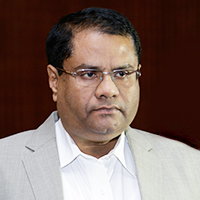 The recent amendments proposed in the Insolvency and Bankruptcy Code (IBC), particularly allowing MSMEs to quote for their own ‘insolvent’ enterprises, will bring great relief to a large number of MSMEs, whose enterprises have become NPA and Bankruptcy filings by the Banks are imminent. The IBC offers a respectable way out for the entrepreneurs from their ‘failed’ enterprises. FISME was the pioneer in its efforts to bring a bankruptcy code in India, in line with those followed in the developed world. However, the IBC as it was initially notified contained quite a few hazy areas for MSMEs, particularly the stricture that ‘wilful defaulters’ will not be eligible to submit resolution proposals for their own enterprises. This was like snatching the sick baby away from the mother and again FISME took up with the authorities for removal of this draconian clause. The reasons for sickness in MSMEs are way different from the failure of the large corporates and the heavy hand to be adopted for the multi billionaire honchos should not be applicable for MSME NPA accounts, was FISME’s argument. We must rejoice that ultimately it has been accepted. "
Mr. Dinesh Chandra Tripathi, President, FISME
|
|
| Vol VI, Issue 152: April 1, 2018 |
|
|
 |
|
|
| Activities |
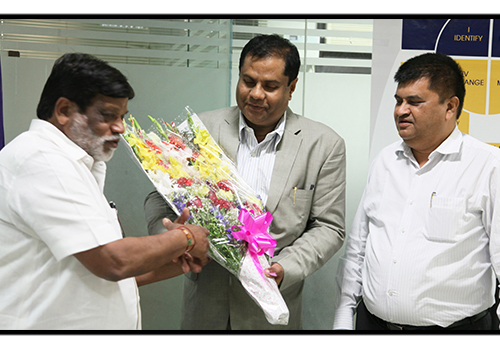 Following the meeting of the central executive committee of MSME body Federation of India, Micro and Small & Medium Enterprises (FISME), Dinesh Tripathi was re-elected as the president for 2018-19.
Mr. Tripathi outlined MSMEs’ access to Public Procurement and Finance as two priority areas in which FISME would focus. He also stressed the need to document various problems faced by MSMEs to initiate a structured reform programme.
FISME Election Officer Mr. Ashok Agarwal announced the result after due process of election.
Mumbai based, Tripathi is a Post Graduate in Commerce having a degree in Cost Management Accounts and a qualified Company Secretary.
|
 |
|
|
| Business Banter: Lessons from Entrepreneurs |
 Running a startup with limited budget can be a stressful experience for entrepreneurs. We see most new businesses fail because of insufficient operating funds. According to CB Insights, running out of cash is the second most common cause of startup failure. Ultimately, the only option left for cash-strapped startups is to consider outsourcing work to cut costs and deal with financial crisis. Hiring remote workers not only saves time and money but also provide startups an access to global talent. At times, outsourcing a fragment of work seems like the next logical step for startups instead of wasting time on opening up another business department.
Entrepreneur India lists out few key areas or services that entrepreneurs should outsource when launching a startup.
|
| Writing on the Wall |
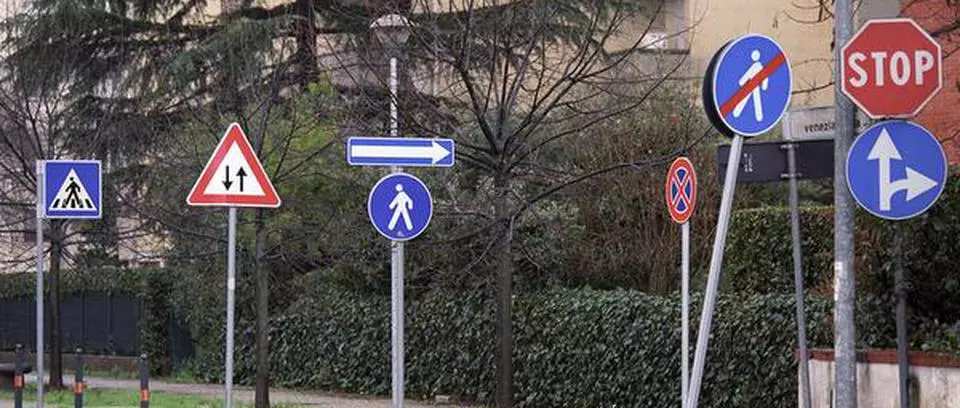
We shouldn’t go overboard regulating fiscal deficit and banking activity, when the economy is short on growth impulses
Last year the Nobel Prize was given for behavioural economics. Behavioural constraints in policy making are under-explored, and can help to understand and perhaps mitigate the over-reaction we are seeing in many areas of policy.
Macroeconomic policy
After the global financial crisis (GFC) excess macroeconomic stimulus led to overheating of the economy. As a result, we bound ourselves tightly in monetary-fiscal rules. There was a welcome strengthening of institutions bringing in a long-run perspective. However, there was over-reaction in “too strict implementation” and neglect of demand.
|
| Media Monitor |
Macro Metre
|
 The Cabinet Committee on Economic Affairs on Wednesday allowed bulk exports of all edible oils except mustard. Mustard oil, it said, will continue to be exported only in consumer packs upto 5 kgs and with a minimum export price of $900 per tonne.
“In order to support growing production of oilseeds and to explore additional avenues for marketing of edible oils, it is required to allow bulk export of all edible oils with the exception of mustard oil, which is an item of mass consumption in India,” government said in a statement.
|
 Responding to the demands raised by the sugar industry, the government on Tuesday announced scrapping of export duty on raw and refined sugar to boost shipments.
The move comes at a time when the country is all set to produce record 29.5 million tonnes (MT) of the sweetener in the present marketing session. Earlier, the export duty on sugar stood at 20%.
It has been decided to reduce export duty on raw sugar, white or refined sugar from 20% to nil, a notification informed.
|
 With an aim to further improve ease of doing business, government of India announced that all pharmaceutical companies can exports drugs and medical devices without obtaining any sort of clearance from drug regulatory authority.
In a notice issued by the Central Drugs Standard Control Organization (CDSCO), it has been clearly mentioned that without obtaining no-objection certificate (NOC) from regulatory authorities, all pharma exporters can exports anywhere within or outside India without any imposed conditionality.
|
 The Directorate General of Foreign Trade (DGFT) has recently restricted the import of pepper below CIF Rs.5OO while it has made import of pepper over and above CIF (Cost, insurance, freight) Rs 500 per kilogram free.
The items for which these restrictions have been put are Pepper, long, Black Pepper garbled, Black Pepper un-garbled, Green Pepper dehydrated, Pepper Pinheads, Green Pepper frozen or dried, Pepper other than green frozen, other crushed or ground.
|
|
|
 Improving ease of doing business for direct selling companies, the food watch-dog FSSAI has done away with the need for agents and distributors of direct selling companies to mandatorily have storage facility or premises for registering with the Authority.
Further, the companies involved in direct selling can also get bulk registration on behalf of their direct sellers on its own instead of each direct sellers getting individual registrations.
“It has been observed that these direct sellers do not have premises/storage facility and therefore find it difficult to obtain registration as direct sellers from Registering Authority. The Direct Selling Agents are attached to Direct Selling Entities (DSE) which are responsible for safe storage and transportation of food products,” the Food Safety and Standard Authority of India (FSSAI) said in an order March 27, 2018.
|
 The Insolvency and Bankruptcy Code review panel called for sweeping changes in the law aimed at easing insolvency rules for small enterprises and providing relief to home buyers by treating them as financial creditors while deeming the amount raised from them for real estate projects as financial debt.
The committee proposed that promoters of micro, small and medium enterprises (MSMEs) who are not wilful defaulters should be allowed to bid during the insolvency process, according to a copy of the report that ET has seen. If adopted, that would vastly improve the prospects of such companies being acquired and revived, thus saving jobs, instead of going into liquidation.
|
 Ministry of Commerce and Industry has extended the exemption from Integrated Tax and Compensation Cess under Advance Authorization Scheme and EPCG Scheme till 1st Oct, 2018.
In an official notification, Directorate General of Foreign Trade stated “exemption from Integrated Tax and Compensation Cess under Advance Authorization Scheme under Para 4.14 of FTP 2015-20 is extended up-to 01.10.2018.”
|
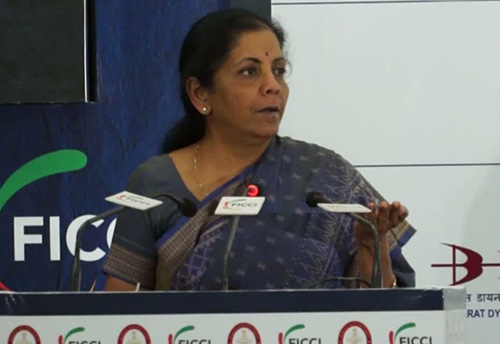 With increased lending, credit flow by NFBCs to the micro, small and medium enterprises (MSMEs) is expected to grow at 12-14% in next five years, an ICRA report said.
As on March 2017, credit to MSMEs stood at Rs 16 lakh crore, according to the report.
According to study report prepared by ICRA, it is expected that the NBFC and housing finance companies will expand their lending base by 20-21% compounded annual growth rate (CAGR) in this space during the period, while bank credit to the MSME segment, which accounted for about 84% of total MSME credit is estimated to grow at lower CAGR of 9-11%.
|
| State Scan |
Delhi
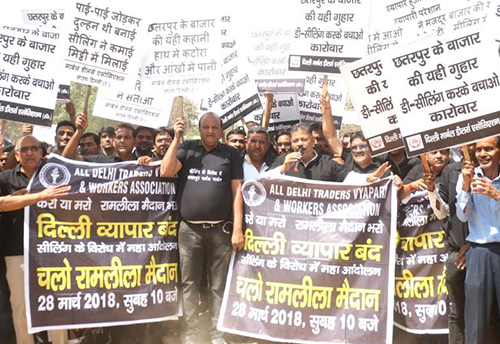 Alleging that the government has turned a blind-eye towards the problems of the traders against sealing drive, the protesting traders from across Delhi have given a seven-day time to the government to resolve the issue.
Talking to KNN, Praveen Khandelwaal, General Secretary, of Confederation of All India Traders (CAIT), said “we have given 7 days time to the state government to resolve the issue.”
He said, if the situation does not improve within 7 days, we will convene the meeting with Delhi traders after a week and decide future course of action.
He further added that state government has turned a blind eye on this serious matter.
West Bengal
 Mamata Banerjee led Bengal Government has decided to set up an information technology (IT) hub in New Town, near Kolkata on the lines of the famous Silicon Valley in USA.
Bengal CM, during a recent administrative meeting, had termed the hub ‘Silicon Valley Asia’.
The hub will come up on 100 acres and aims to create many jobs.
It may be mentioned that IT giant Infosys has already registered 50 acre of land in New Town and will start construction soon. Another IT firm – Wipro – has also taken 50 acres, according to the additional chief secretary, IT Department, at a recent administrative review meeting, said All India Trinamool Congress.
Uttarakhand
 State government of Uttarakhand allocates Rs 45,585 crore for Uttarakhand Budget 2018. Chief Minister Trivendra Singh Rawat and finance minister Prakash Pant presented the budget during the budget session of the state assembly on Thursday.
The key highlights of the budget for the development of industrial sector are organization of industrial development fairs to attract new investments, launching of ‘Destination Uttarakhand’ to attract investments and setting up growth centres.
Gujarat
 Owing to increase in prices in international market and reduced demand in domestic market, onion dehydration units are suffering in terms of piling up of unsold stock indirectly hampering the production in Gujarat.
Many Onion dehydration units in the state of Gujarat are on the verge of closure. Further, ministry of commerce and industry has reduced the transport assistance from 7% to 3% which has worsened the situation more.
In numeric terms, the 2016 production of dehydrated onions were approximately 60,000 tonnes and out of which 20,000 carried forward to the next year. Similarly, in 2017, 25000 tonne out of total production of 60,000 tonne has been carried forward to this year. This increase in unsold stock has led to indirect dampening of the current year’s production.
|
| World Watch |
Ghana 
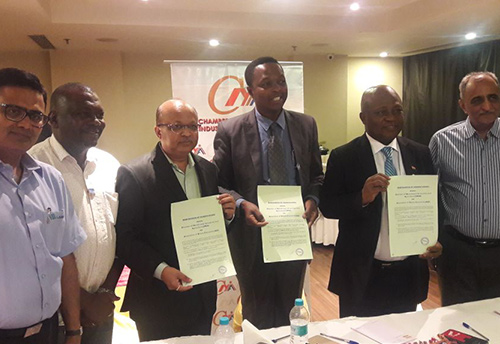 To strengthen bilateral relations and to explore and develop the business trade relations between India-Ghana, Chamber of Marathwada Industries and Agriculture (CMIA) has signed a MoU with Association of Ghana Industries (AGI) on March 28, 2018.
The aim is to explore the business opportunities of collaboration in areas like engineering, pharmaceutical, agriculture, food processing, jewellery making etc.
China 
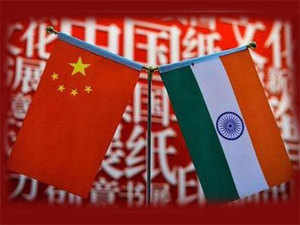 China is keen on a bilateral investment treaty (BIT), addressing the trade deficit and setting up industrial parks in India and has sought India’s cooperation on matters of common interest at the recently-held Joint Group on Economic Relations, Trade, Science and Technology.
“China expressed interest in increasing investments in India and highlighted the BIT,” said a government source aware of the development, adding that further discussions would be held with the Department of Economic Affairs. The China-India BIT came into force in August 2007 and was terminated in July 2017 after India asked partner nations to renegotiate on basis of the new model text.
Hong Kong 
 Eyeing at enhanced transparency between the two countries, India and Hong Kong signed a double taxation avoidance agreement (DTAA) recently.
The agreement between India and the Hong Kong Special Administrative Region (HKSAR) of the People's Republic of China was signed by Indian Ambassador to China Gautam Bambawale and his counterpart Hong Kong Finance Secretary Paul Chan Mo-po in Hong Kong, an official release informed.
Malaysia 
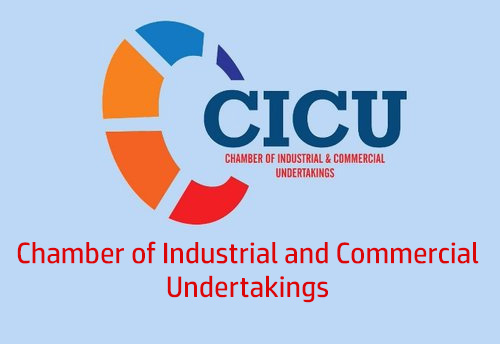 In a meeting with Chamber of Industrial and Commercial Undertakings (CICU) and Malaysian SME chamber, Malaysia promised to support CICU food clusters in India.
18 CEOs from Malaysia and other prominent members attended the meeting.
Sh.Upkar Singh Ahuja, President Chamber of Industrial and Commercial Undertakings (CICU), said that Food production in India is only 7% as compared to other Asian countries like Malaysia-73%, Thailand-72%, Philippines-78% and it is growing at about 5% per year, with dairy, bakery etc.
|
|
 |
 |
 |
 |
FISME’s official Twitter handle @fisme |
 |
KNN India’s official Twitter handle @knnindia |
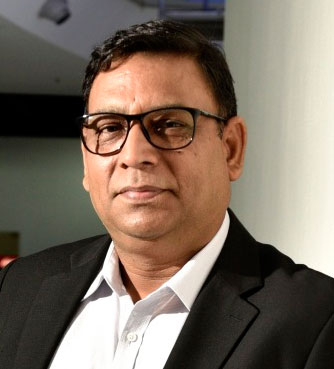 |
|
|
| Other Events |
Hotel Investment Conference South-Asia
Date: 04-05 Apr 2018
Venue: Grand Hyatt Mumbai, Mumbai
See Details
Technological Innovations in ICT for Agriculture and Rural Development
Date: 05-06 Apr 2018
Venue: SRM Easwari Engineering College, Chennai
See Details
Secutech India
Date: 05-07 Apr 2018
Venue: Bombay Convention & Exhibition Centre (BCEC), Mumbai
See Details
Live Seminar on Import & Export Management
Times Asia Jewels Fair
Date: 06-08 Apr 2018
Venue: Conrad Bengaluru, Bengaluru
See Details
International Conference on Electrical Electronics & Communication Engineering
Date: 08 Apr 2018
Venue: Trinity Isle, Bengaluru
See Details
Kolkata Jewellery & Gem Fair
Date: 07-09 Apr 2018
Venue: Acharya Mahapragya Mahashraman Education & Research Foundation, Kolkata
See Details
India Shoes & Accessories Forum
Date: 12-14 Apr 2018
Venue: Bombay Convention & Exhibition Centre (BCEC), Mumbai
See Details
RenewX
Date: 13-14 Apr 2018
Venue: Hitex Exhibition Center, Hyderabad
See Details
Fashionista Exhibiton
Date: 13-15 Apr 2018
Venue: Hotel Centre Point, Nagpur
See Details
|
| Your Views |
Industrial output soars to 7.5%. Do you feel that India can reach the magic number of 8 % growth rate in near future?
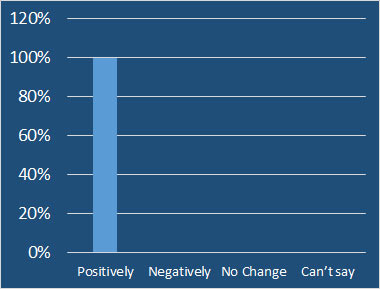
As Industrial output soars to 7.5%. According to FISME Factor 33.3% MSMEs feel that India can reach the magic number of 8% growth rate in near future, 50% feel otherwise and 16.6% can’t say.
|
| Knowledge Store |
HR Heuristics
4 Tips for Writing an Effective Performance Review
 Creating the proper foundation for high performance teams is becoming ever more important in corporate environments where collaboration is increasingly seen as the solution to superior output.
What to consider when building a high performance team
1] Size – A classic mistake in team formation is to include too many members. Teams with more than eight people often suffer from challenges in coordination, increased tension, and reduced productivity. This may be the result of some individuals not getting the desired airtime and others simply switching to a passive mode since “someone else is in charge”. Thus, research suggests that efficient teams include up to 6-7 members – an ideal size for managing different points of view.
|
Finance Fundamentals
Planning to Avail a Business Loan? Important Things to Consider
 Business loans are a boon for businesses looking to expand and charter new territories. However, applying for a business loan may not be all plain-sailing.
Here a few things you ought to know about a business loan to make the process simpler and more efficient. Know the Types
There are mainly two types of business loans available, secured loans being the type protected by an asset or collateral. This type of loan requires collateral or a guarantor.
|
|
Marketing Mantras
Why customer engagement is the growth hack for small businesses
 With every business going digital with the aim of taking their products and services to a global market, it is also important to understand that competition is rising by the day.
As smaller businesses struggle to keep up with the demanding digital channels, there are also bigger players in every industry that make the going more challenging - especially with greater advertising budgets.
|
|
Policy Polemic
With GST refunds stuck, Tirupur exporters urge Govt to stop IT Dept from sending notices over advance taxes
 The Tirupur Exporters Association (TEA) has urged Prime Minister Narendra Modi to immediately direct the revenue department not to attach the bank accounts of exporters who fail to pay the advance tax.
In his letter to PM, TEA President, Raja M Shanmugham, said that such actions will affect the morale and spirit of business community.
|
|
SME Special
How StoreKing is connecting rural India to the digital world of online shopping
 The gap that exists between urban and rural India is never more evident than when looking at how far we have grown as a global economy. While the former has made great strides towards smart cities and state-of-the art services, pockets of the hinterland have limited access to even the most basic amenities and products. This is largely because of poor connectivity, language barriers and lack of a logistics services that go that last mile.
This is where StoreKing, a Bengaluru-based startup, steps into the picture. This technology -enabled distribution platform is connecting small towns and villages across the country to a range of products and services, all via an app.
|
|
Success Story
How Dhirendra Singh made it big by selling juice in small towns
 Dhirendra Singh grew up in rural northern India but later founded Manpasand Beverages in his adopted state of Gujarat. As he tells it, however, it was only while back there sipping tea at the border of Uttar Pradesh and Bihar in 2009, from a cup costing less than a rupee, that the juice baron had a eureka moment.
|
Stockpile
The central statistics office (CSO), ministry of statistics and programme implementation has released the quick estimates of index of industrial production and use-based index for the month of January, 2018 (base 2011-12=100)
|
Quotable Quotes
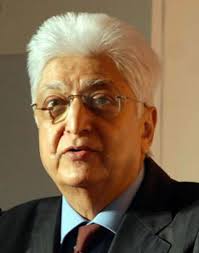 “
Excellence endures and sustains. It goes beyond motivation into the realms of inspiration.
”
– Azim Premji-An Indian business tycoon and chairman of Wipro Limited
|
| Country Chronicles |
|
FISME regularly receives monthly reports on the economies of various countries from their missions in India. These reports provide information on key economic parameters, trade related information and all news relevant for importers and exporters. In this edition you can take a look at reports on:
|
| New Members |
During the period from 15th March 2018 to 31st March 2018 a total of 5 new MSME became members of FISME
|
| Reader Reactions |
Write and Win prize!
Write your comments on the FISME Factor. Share your views and suggestions on MSME issues. Win prize! The best mail will get a special book every fortnight.
send mail to: newsletter@fisme.org.in
|
| Editorial Team: |
Hon. Editor: Anil Bhardwaj
Asstt. Editor: Kalpana Sharma
Types setting & websdesigning: Sanjay Sachan
Video & Photography: Vipul Kumar Chettry
|
|
|
|
You are receiving this Newsletter because you are included in our mailing list of recipients who are involved or interested in FISME or Indian MSMEs. You are welcome to partly or fully reproduce and disseminate the contents of this publication provided that you acknowledge the source.
To subscribe/unsubscribe to this Newsletter
click subscribe or unsubscribe
This Newsletter is edited by the FISME Secretariat. We welcome contributions as well as comments and suggestions. Please write to newsletter@fisme.org.in |
|
|
 |
Bangalore
57/5, Family YMCA Building,
Millers Road, Benson Town,
Bangalore - 560046
Tel: +91-80-23543589
Email: bangalore@fisme.org.in
|
Hyderabad
H. No. 6-3-569 / 1/2/4
2nd floor, Rockdale Compound, Somajiguda
Hyderabad – 500082
Tel: +91- 40- 23322117 Fax: +91 -40- 23312116
Email: hyderabad@fisme.org.in
|
Chennai
No. 17/22, 1st floor,
4th Main Road, New Colony, Chromepet
Chennai – 600044
Tel: +91-44-43848805
Email: chennai@fisme.org.in
|
|
| |
Jhandewalan
Tel: +91- 11- 4364 2013
Email: chamber.jw@fisme.org.in
|
Mahipalpur
Tel: +91 -11- 46035866
Email: chamber.mpur@fisme.org.in
|
Kalkaji
Tel: +91 -11- 4106 8644
Email: kalkaji@fisme.org.in
|
|
|
|

|

|

|

|

|

|

|

|

|
|
|